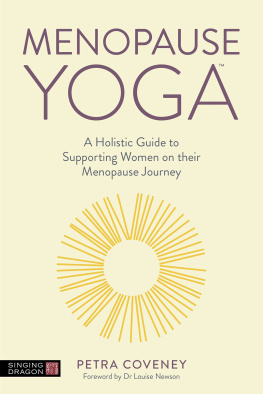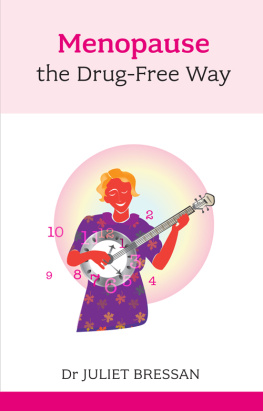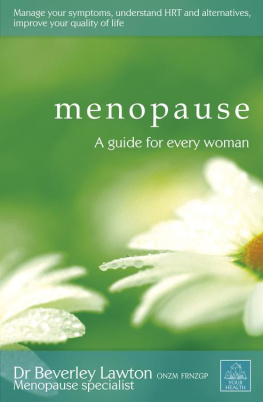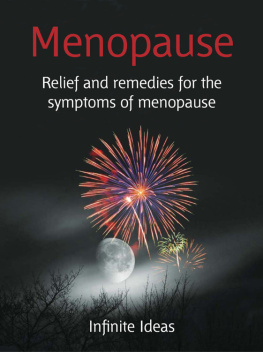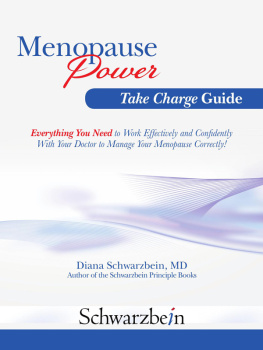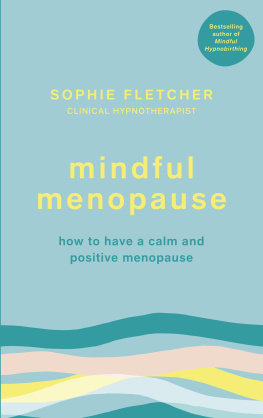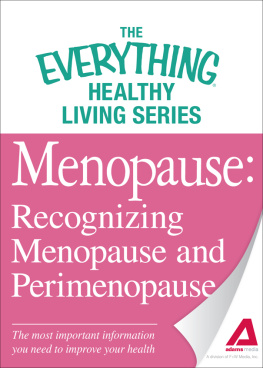Pat Wingert - The Menopause Book
Here you can read online Pat Wingert - The Menopause Book full text of the book (entire story) in english for free. Download pdf and epub, get meaning, cover and reviews about this ebook. year: 2018, publisher: Workman Publishing Company, genre: Romance novel. Description of the work, (preface) as well as reviews are available. Best literature library LitArk.com created for fans of good reading and offers a wide selection of genres:
Romance novel
Science fiction
Adventure
Detective
Science
History
Home and family
Prose
Art
Politics
Computer
Non-fiction
Religion
Business
Children
Humor
Choose a favorite category and find really read worthwhile books. Enjoy immersion in the world of imagination, feel the emotions of the characters or learn something new for yourself, make an fascinating discovery.

- Book:The Menopause Book
- Author:
- Publisher:Workman Publishing Company
- Genre:
- Year:2018
- Rating:3 / 5
- Favourites:Add to favourites
- Your mark:
- 60
- 1
- 2
- 3
- 4
- 5
The Menopause Book: summary, description and annotation
We offer to read an annotation, description, summary or preface (depends on what the author of the book "The Menopause Book" wrote himself). If you haven't found the necessary information about the book — write in the comments, we will try to find it.
The Menopause Book — read online for free the complete book (whole text) full work
Below is the text of the book, divided by pages. System saving the place of the last page read, allows you to conveniently read the book "The Menopause Book" online for free, without having to search again every time where you left off. Put a bookmark, and you can go to the page where you finished reading at any time.
Font size:
Interval:
Bookmark:
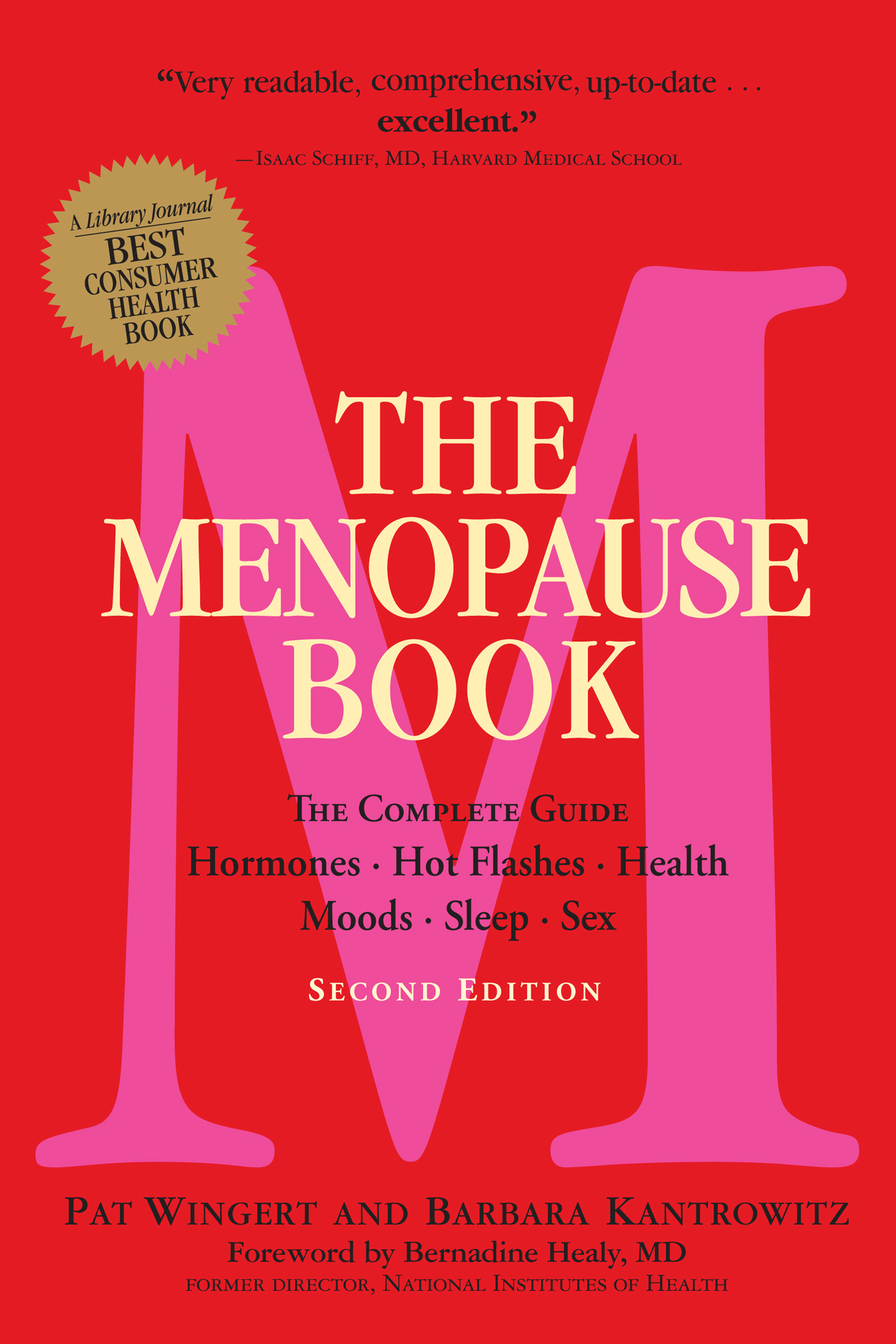
The
Menopause
Book
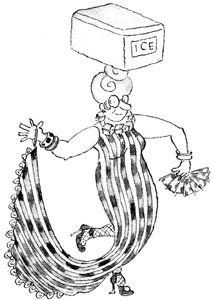
Pat Wingert and Barbara Kantrowitz
Foreword by Bernadine Healy, m.d.
former director, National Institutes of Health
Workman Publishing New York
To the women in our lives: our mothers, our sisters, our friends, our daughters and those we love as daughters. We wish you health and happiness.
Foreword
M idlife women today dont fit yesterdays stereotype: ladies a tad frumpy, a lot depressed, mightily struggling with the mysteries of menopause as they waited to follow their ovaries into oblivion. We no longer buy into that silliness. The 40- or 50-something woman of todaysmart, informed, involved, generally looking good and feeling healthyis hardly defined by her menopausal status. But that does not diminish the fact that menopause is an important health consideration for every woman. Unique to the female of the species, the loss of ovarian function heightens the awareness of aging and age-related health vulnerabilities that mount in the second half of life.
The good news is that information is literally pouring out of the halls of medicine, putting old myths and taboos to bed and enabling women to deal practically with the biological and psychological issues surrounding this transitionor change, as it was once called. And this information is good, based on high-quality research. This, too, is a change from just a few years ago. In the past, womens health research languished. Indeed, since the male was the normative standard for health, studies unique to women were largely left undone.
The last decade of the 20th century saw an explosion in research on women. The Womens Health Initiative (WHI), which I began as a labor of love back in 1991 during my tenure as director of the National Institutes of Health, is a large, audacious, and in-depth study of women in the menopausal years. By design it looks holistically at the health of women and at the full range of threats that rear up during this time in a womans life. The magnitude of this study, which blankets the country with its 40 clinical research centers and taps into an army of over 150,000 committed participants, is but one affirmation that womens health is no passing fancy, no niche market, as a pharmaceutical executive once noted.
The myths and mystiques of menopause have crumbled under the weight of focused research, confounding conventional wisdom and shaking up some medical practitioners. But the message that has come through loud and clear in this vibrant era of womens health is not just the obviouswhat works for men doesnt always work for womenbut, more important, whats right for one woman is not always right for all women. Take hormone therapy. Not long ago, women were told it was good for every woman and for the rest of her life. Surprising findings from the WHI randomized clinical trials put a damper on that notion. Hormone therapy is a plus for some women and a hazard for others. And figuring out which is which for any given woman becomes more complex but more real as we learn a little more every day about how hormones interact with our brains, our breasts, our bones, and our hearts. Doctors have learned that they must individually tailor each womans treatment plan, taking into consideration her age and health, her motivation and quality of life, and her own experiences and personal choices.
Research is also making it clear that how we live our lives, what foods we eat, how much we exercise, and how vigilant we are about our checkups and screens can make all the difference in our health. Both doctors and patients are beginning to realize that the future of womens health will be predictive, preventive, and personalized. This new approach to medicine will require each of us to be more actively engaged in making the health decisions that affect our lives. Working in partnership with our doctors and other caregivers, each of us needs to figure out just what is to be our own personal path.
But paths need objective guides and reliable roadmaps. And that is the mission of Pat Wingert and Barbara Kantrowitz. As they point out, menopause is not just the end of fertility and the child-bearing years that are so often seen as womens prime. It is the time for a woman to take charge of her health and make the changes that will carry her through her second prime time. Im confident that Pat and Barbaras book will get you headed in the right direction.
Bernadine Healy, M.D.
Contents
The Basics
Mirror images: the beginning and end of menstruation When does the menopause transition begin? The stages of menopause The different kinds of menopause (natural, induced, early) Menopause in the animal world How long does it take? Can it be temporary? Hormones and your reproductive life Are you out of eggs? Whats normal and whats not Do menopause tests work? Can menopause be reversed? The pill and perimenopause Late pregnancies Estrogen in your body after menopause An ending and a beginning
All about estrogen A primer: pills, creams, patches, shots, bioidenticals A history of hormone therapy and how it came to be part of every doctors arsenal The importance of the Womens Health Initiative The dilemma of contradicting studies How to understand news about medical research Why you might still want to try hormones and what you need to know to make your decision When is the best time to start hormones? Hormone therapy and cancer: What are the risks? Does estrogen cause weight gain or make you look younger? The truth about bioidenticals Alternative treatments that might help and some that dont Plus: Case studies of five women who made the decision
What Youre Feeling Now
How and why you get them Anatomy of a flash Why some women are frequent flashers and others never break a sweat How to feel better with and without drugs Hot flash fashions Do fat women flash more than skinny ones? What if its not menopause? How long will a hot flash last? How hot is a hot flash? Why do you shiver afterwards? The emergency kit every working menopausal woman should keep in her desk drawer Tracking triggers Does exercise help or hurt? Can antidepressants work? Relief without an Rx
Why insomnia often strikes now The role of estrogen Snoring: a sign of trouble? Common sleep disorders How to finally get the rest you need Setting the mood for sleep Why a glass of wine before bed wont do the trick Foods that can keep you up and ones that make you sleepy Is it depression? Sex before bed (or not) Why youre beating a path to the bathroom Keeping a sleep diary Physical problems that rob you of sleep Hot and cold couples The role of exercise Sleeping pills and natural remedies
The rise and fall of libido How to improve your sex life Body changes that can make sex more painful Getting expert help Sex toys and where to buy them Hormone therapy and libido Why orgasm can be elusive New thinking on women and sexual dysfunction What you need to know about testosterone Could Viagra be the answer? Better-than-ever orgasms The thrill is gone, and thats fine with me How to fix lubrication problems The connection between allergies and vaginal dryness Vaginal estrogen cream and your partner Alternative treatments Yeast infections and how to fight them Starting to date again Why contraception and safe sex still matter The right way to Kegel Bleeding during sex The depression-sex connection Hysterectomy and sex drive Chemo and libido Sex after radiation Whats in the medicine chest? What if its his problem, not yours? What you need to know about sexually transmitted diseases
Next pageFont size:
Interval:
Bookmark:
Similar books «The Menopause Book»
Look at similar books to The Menopause Book. We have selected literature similar in name and meaning in the hope of providing readers with more options to find new, interesting, not yet read works.
Discussion, reviews of the book The Menopause Book and just readers' own opinions. Leave your comments, write what you think about the work, its meaning or the main characters. Specify what exactly you liked and what you didn't like, and why you think so.

